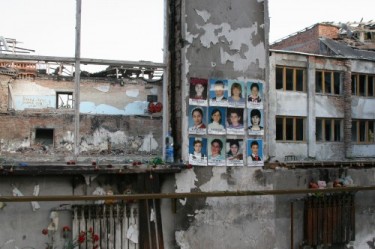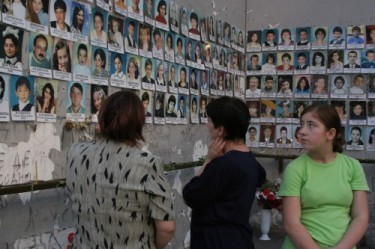Saturday, September 11, 2010
A suicide car bombing outside a market in Vladikavkaz, the capital of the Republic of North Ossetia-Alania, killed at least 18 people and wounded over 100 on Sept. 9. The attack is not the first one to occur at this location (62 people were killed there in 1999, 12 in 2008); it also came just days after the sixth anniversary of the 2004 school siege tragedy in Beslan, a town 15 km north of Vladikavkaz.
North Ossetian bloggers' initial reactions to Thursday's market blast reflected their exasperation with the ongoing violence in the region.
LJ user liza-valieva, a Vladikavkaz-based journalist, wrote (RUS):
An explosion at the central market, again. Half an hour ago. Could be heard even here.
There are the dead and the wounded.
Will it ever end?
Below is one exchange from the comments section:
maxialla:
I've never been a supporter of this point of view - "[the best way out is to move elsewhere]" - but right now it [appears rational] :( [...]
liza_valieva:
It is always possible to move, but people I care about will still stay behind, and no matter where I am, I'll worry about them just as much.
Moscow-based LJ user glazastikk wrote (RUS):
[...] My sister said that papa was fine, and then I got through to him myself, asked him to leave the market, because I was afraid there'd be a second explosion. [...]
And then I was scared for all those who have failed to get through to their folks on the phone. And I keep thinking of it ever since [...].
[...]
I'm sick of being scared and worried. And I don't see a way out. [...]
LJ user manavar, a Vladikavkaz-based medical student, was at the local hospital at the time of the blast. He wrote (RUS):
[...] Ambulances, [public mini-buses], regular cars were rushing in. We unloaded a woman whose arm had been blown off. Then there was another one, missing an eye. Seventeen people were brought in. Two corpses. One person, already dead, was lying on the floor of a yellow mini-bus. A man. One woman died at the ER. Most people had shrapnel cuts. [...]
As always, there was not enough medications. [...] For the first hour and a half, there was chaos at [the hospital], strangers were walking around. Things got better only when the police had cordoned off the hospital.
People were saying that at the school near the site of the bombing all the windows had been blown out and the children had been cut with shrapnel.
[Damn!] When will it all end!
In another post, LJ user manavar wrote (RUS) about his mother's experience that day:
[...] Mama was at the market at that time, she was walking around the aisles inside and was just planning to go to a store [...]. She stayed on [inside] for a second longer to look at the vegetables. The blast was so powerful that her ears got plugged. [...] Mama managed to squeeze herself into some niche and thus avoided the stampede. People ran, fell down, got up, ran again. Hundreds of people running from the area where black smoke was rising; only a few running towards that area. Some in order to help, others because they'd left their dear ones there. Only when the crowd receded, mama was able to get out of the niche and also went towards the exit.
Her hands are still shaking. And I can still see that woman with one eye missing. She is somebody's mother, too.
LJ user manavar's first post was featured (RUS) in the Radio Echo of Moscow's blog section. He admitted that such publicity upset him, but his post also sparked a discussion that highlighted a rather common perception of Russia's North Caucasus as a mismanaged "someplace else":
osokin:
You constantly have terrorist attacks over there! So why was there "not enough medications" then? Who is responsible for the supplies?
crafty:
I am a Muscovite. And it's OVER HERE in Russia that there are terrorist attacks and it's OVER HERE that there is chaos with medications. The fish rots from the head. Just imagine that the blast took place at a market in your neighborhood - there wouldn't even be enough [blood] plasma at the local hospital, let alone everything else.
LJ user gagloyev, a Moscow-based Ossetian blogger, detected a similar note of detachment in PM Vladimir Putin's statement on the Vladikavkaz market attack:
"They have all they need OVER THERE..."?
These are the words of Vladimir Vladimirovich Putin from his dialog with Russia's deputy minister of health care and social development Belov during today's [government] meeting (broadcast on all TV channels today).
A question: Mr. Putin doesn't consider North Ossetia part of the Russian Federation anymore?!
And this person wants to be the national leader?! [...]
Vladikavkaz-based LJ user alan_tskhurbaev wrote this, among other things, in a comment to LJ user gagloyev's post:
[...] All in all, why pick on their words when there are so many of their actions that we can be critical of [...].
LJ user firmozadasso commented (RUS) on the government's promise to pay 1 million rubles ($32,388) to the victims' families:
[...] Anyone needs a million in exchange for a family member's life?
One Radio Echo of Moscow commenter pointed out another financial aspect in the relations between North Caucasus and the rest of the Russian Federation, voicing his displeasure with the arrangement:
evgeniy_pak:
Does Russia need Caucasus at all?
Federal budget spending on the North Caucasus federal district - [annual] funding allotted per resident:
Kabardino-Balkariya - 12,000 rubles [$388]
Karachaevo-Cherkesiya - 13,000 rubles [$421]
Dagestan - 14,000 rubles [$453]
Ingushetia - 27,000 rubles [$874]
North Ossetia-Alania - 12,000 rubles [$388]
Stavropol region - 6,000 rubles [$194]
Chechnya - 48,000 rubles [$1,554]
Average spending on residents elsewhere in Russia - 6,000 rubles [$194]
There are good people living over there (and the majority doesn't even suspect how profitable this business - the Federation - is), but isn't it time to [stop it]? Is there no other way to spend billions?
LJ user chuchundrrra, in a comment to LJ user dondzendervish's post (RUS) on the alleged involvement of fighters from the neighboring Ingushetia in Thursday's bombing, explained the connection between federal budget spendings, corruption and terrorism:
After each terrorist attack, the money starts flowing - flowing where? To ensure security. Have you noticed strengthened security? I haven't. So where does the money go? Into somebody's pockets. And what has to be done to make sure that the money in the pocket is in good supply? Right, more money should be given for a new terrorist attack. [...]
The volatile Ossetian-Ingush relationship has been another recurring theme following the market blast. LJ user dondzendervish wrote this in the post linked to above:
Terrorists do have an ethnicity. They do have last names. A Volga [car] with the Ingush license plate. With the driver named Archiev, registered with Dobriev. Many people say that terrorists do not have an ethnicity, but why are they all from Ingushetia?!
It's time to set up a minefield, a tall electrified fence and watchtowers with machine gunners all along the perimeter [of the border] with Ingushetia. [...]
LJ user magas-dedyakov wrote (RUS):
[...] Close the border [with Ingushetia]. Completely. For five years, to begin with. Legalize border guarding by volunteers and [the Cossacks]. Allot salaries [to them].
Madina Sageeva wrote this (RUS) on the North Ossetian blogging portal region15.ru:
I know what has to be done to stop terror attacks in North Ossetia. Guests from Ingushetia have to be banned from entering the republic.
[...]
And if our neighbors start singing about their right to move freely around their beloved motherland - Russia - we can reply to them that the Ossetians have a right, too - the right to life.
[...]
[...] I'm not accusing all the Ingush people of [being involved in terrorism]. But, alas, the police officers at the checkpoint through which hundreds of Ingush are pushing their way into Vladikavkaz every day, cannot tell the terrorists just by looking at them. [...]
It would be good if the Ingush president came forward with such an initiative. [...]
LJ user kaloy (Kaloy Akhilgov, press secretary of Ingushetia's president Yunus-Bek Yevkurov) was planning to visit his grandfather's grave in the Ingush village of Dzheyrakh on the day of the bombing (which was also the first day of the Muslim holiday of Eid ul-Fitr) - and the best way to get there was by driving through Vladikavkaz. He wrote (RUS):
[...] The Ingush people are used by now that terrorist attacks in Vladikavkaz tend to turn into ordeals for them. Because any emergencies caused by explosions in Ossetia are tied to the Ingush, unfortunately. Perhaps, this happens subconsciously.
In any case, we decided not to drive through [Vladikavkaz]. Not because I'm afraid of the Ossetian cops [...]. But because I understand that one should not annoy the cops and the locals by having them see [Ingush license plates] [...].
We encounter [such violence] in our republic every day as well, and we understand perfectly well the pointlessness of [spilling innocent blood]. [...]
LJ user agunya - a Beslan survivor Agunda Vataeva, whose story was translated on GV on Sept. 4 - wrote (RUS):
A horrible provocation.
[...] I'm sick of seeing how we are being killed. I'm sick of being scared. I'm tired of calling all the relatives [...] with [a well-rehearsed speech]: "Are you ok? Is everything fine at home? No one is hurt?" No place to escape from this. Nowhere in the country.
[...]
I don't want to live in this country, in such a world. I hate the Ingush idiots who cheer other people's grief and are ready to dance on the bones and blood of the Ossetians [...]
[...]
My grandmother is Muslim, and I never say that all terrorists are Muslim, or that terror has an ethnicity. Terror has specific faces. And other people have to preserve human qualities, even if their enemies are being killed; they shouldn't cheer the deaths of innocent people. [...]
LJ user liza-valieva wrote this (RUS) in a follow-up post:
Because of the terrorist attack, all day today we've been getting calls, text messages and letters from friends in Moscow, Rostov, France, Italy, Slovakia, Turkey, Georgia and other places.
Friends, thank you for being there! Thank you for caring.
The things I've read today on the internet... Forums where Ingush were cheering the deaths of Ossetians [...], and Georgians were gloating along the lines "here you go, the Great Russia!", blogs where Russians were writing something like "Caucasus isn't Russia. The main thing is that this doesn't happen in the 'real' Russia, and who cares what's happening OVER THERE" [...].
After all this, it's hard not to get disappointed in people. That's why thanks again to those who care. It can happen to any of us. No one is safe.

